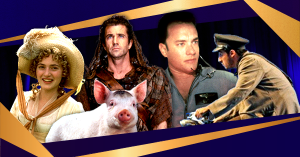Director Steve McQueen on Michael Fassbender’s Shame
The British filmmaker discusses sex addiction, the importance of trusting the audience, and why he originally thought his star was a cocky bastard.
Acclaimed visual artist (and tough guy namesake) Steve McQueen made an astonishing feature film debut with 2008’s uncompromising prison piece Hunger, a movie that also drew attention to a daring performance from its emerging star, Michael Fassbender. This week, the pair reunite for their second collaboration, Shame, in which Fassbender plays Brandon Sullivan, a New York yuppie trapped in an emotionally crippling labyrinth of sex addiction. The movie, which co-stars Carey Mulligan as Brandon’s wayward sister Sissy, finds McQueen trading one form of incarceration for another — and has placed Fassbender squarely in the acting race for Oscar prognosticators. We had the opportunity to chat with the ever-lively director in Los Angeles recently, where he shared some thoughts on the film.
Hunger was such an audacious debut. How did you go about choosing a follow-up?
Steve McQueen: It was a situation where, for me, it’s not a second film — it’s a continuation. It was just a continuation from where we left off in Hunger, in a way. [Co-screenwriter] Abi [Morgan] wanted to meet me and I wanted to meet her, and we ended up speaking for three-and-a-half hours. We started talking about internet pornography and then we got on to sex addiction, and that was it — the seed was planted. And I thought, “Wow, that would be amazing.” Previously, I’d wanted to put down the gun — I wanted to make a love story — that’s what I really wanted to do, and then having this conversation with Abi I thought, “This was it.” In a comparison with Hunger, again, it’s about someone who’s using their body. Bobby Sands [played by Fassbender in Hunger] has a situation where he’s in a maximum security prison, and in order to create his own freedom he doesn’t eat — he stops from eating, which liberates him — whereas Brandon is in a completely different, opposite situation where he’s in New York and he’s a very attractive man with a very good job and well-paid, in an ultra-capitalist Mecca where you can access anything you want — so-called “freedom” — and in many ways what he’s doing is putting himself in a sort of prison through his sexual activities.
Do you see his life as a prison, or his addiction as the prison?
He’s imprisoning himself with his addiction, of course. He’s trapped. I would imagine, like anyone who’s addicted to anything, that they would love not to be addicted to it. When something’s taking up your time and ruining your life, in a way, and mucking up your head, you would prefer to stop. And that’s his prison. So the opposites — of Bobby Sands and Brandon Sullivan — is interesting for me. And also the performance of Michael, what he has to do. Because with Bobby Sands, as an IRA prisoner, his organization has pushed violence to the ultimate limit, and what you do then is you push language to its ultimate limit, and that’s what Bobby Sands did. Michael’s a very verbal, physical character, and pushing himself on language, and the limits of reason within language. On the flipside you’ve got Brandon, who’s not a big talker at all. He’s very insular: everything is happening inside; he’s imploding. You see everything on his face but nothing verbally is coming out — nothing real, verbally, is coming out.
Was it always going to be a film made with Michael?
Yes, absolutely.
What is it about Michael that originally drew you to him as an actor?
Well at first I couldn’t stand him; I thought he was a cocky bastard. [Laughs] In the audition [for Hunger] I thought, “F–k, where’s he at?” Then he came back and, of course, it was love at second sight. I think that it was, with Michael, it’s a way to work with someone who gets you — and I get him, so it’s all second nature. What he has is that he’s a very masculine man, but there’s a huge femininity in him. There’s a huge female quality in Michael, of vulnerability, which I think is extraordinary, because most actors would not be that vulnerable. Everyone likes to be the hero or whatever, but in his vulnerability and his femininity there is strength, and I think, for me, that’s his appeal. Basically he’s not removed from you, the audience — he is you. You see yourself in him, and that’s genius. Not a lot of actors can do that.
He’s also willing to push himself to physical extremes for the role.
That’s a part of it, I suppose, but that’s not the biggest part of it. I mean, any guy can starve and not eat; that’s not the point. What he does is that he transcends that — that’s the point. He transcends the physicality. That’s the thing.
What brought Carey to the role of Sissy?
Well, Carey found the script. I don’t know how she did it, but she found the script and she asked to be introduced to me, to have the part of Sissy. I met her for the first time and we spoke, and I thought there’s a desperation to her that I quite liked. I thought that’s interesting for the character, and I offered her the role on the spot. It was very simple. And a lot of people say now, “Well she’s not the first person you would normally have as the first choice,” but I don’t buy that. I don’t buy that at all. Because I think people have these ideas about who you think you are rather than who you actually are. And she had this kind of desperate, real need to do this part, and I liked that.
So apart from Michael, you don’t have any preconception of who you want for roles?
I don’t think you can. I think as a director you’ve got to be open. I mean, just in the research of the film I didn’t know what we would come across. This whole film is because of the research. I didn’t know, in the planning of the script. I wouldn’t be arrogant enough to think “Okay, this is what’s gonna happen” before I actually researched it. The actual research, the interviews that we had with people who were sex addicts, they had to sort of give us the story. That’s what this is about: You’re following the situation to where it wants to lead you, rather than you putting your stencil on something. I don’t wanna do that. I never want to put my stencil on to something — I want it to inform me.
The New York of this film is very oppressive in its glossy banality; it’s certainly not Woody Allen’s Manhattan. What’s your personal experience of the city?
Well I’ve been going there a long time. Most of my family comes from New York, but a lot of them have now retired and dispersed. I’ve been going to New York since ’77, since the blackout and Elvis dying, and I go to New York at least three times a year for work — I’m an artist as well. So it’s not unfamiliar to me, but at the same time we did a lot of research; I didn’t want to have a situation, you know, where I was cocky and said “Well, I know New York.” It seems to work with London as well: If I’m shooting a film in London, I will want to do some more research on it. I think what happened in our New York is that it was about ritual, following the actors and just being honest. The running sequence, for example, is running like people do. When you’re running at a certain hour of the night, you see what you see. The subway, I think, was interesting. I don’t think there’s a lot of films being shot on the subway for real. No one films the subway because they think it’s boring or not particularly interesting, but I mean lots of things happen on the subway. The whole idea of New York and this grid system; things are gonna happen. It’s an amazing environment for possibilities.
The scene with the eye contact between Brandon and the married woman — it actually happens, doesn’t it?
Yeah. I mean it’s a great environment for possibilities, and that’s what we wanted. Things are gonna happen. You’re gonna bump into the same people every day when you go to work, you know. People are gonna fall in love through the city, because it has a certain kind of possibility in there — it’s not just parties and bars, it’s actually street stuff.
Was there a lot of improvisation on the set?
Oh, absolutely. What we did, we rehearsed it like a month before we shot, and it was so good after the second day that I stopped it. I said, “No more; no more of that.” What was so wonderful was that we had a month to forget about it. Within those two days of rehearsal we made a lot of notes, of course, so you could bring those back into the preliminary script and bring them back to the actors when they’re just about to go for a take. So it’s kind of interesting. I love rehearsing, but I’m grateful that we did it a month before, and it was only two days and I stopped it. The f–king plane was taking off the runway and I didn’t want it to do that. I got a bit scared, so I thought, “Okay, stop it,” and then after a month it was enough time for the actors to forget what they did. You could introduce certain things into the script and they all worked very well. But yes, you need that space. The framework is there; all you gotta do is work with the framework.
There’s a lot more dialogue in this than Hunger, but it doesn’t always impart much. Was that deliberate?
People don’t speak much and then when they speak it’s bullsh-t. People speak nonsense. In movies when people start speaking, they tell you the truth and tell you what’s going on. That never happens in real life. We just use it, sometimes, to make people feel comfortable; to full space, to fill time. We use it to sort of get by. What we really think, and what we really feel — it never comes out. Never comes out. That’s why Brandon is so much inside himself. Sissy is that sort of person who says too bloody much; when she talks she’s telling you everything, and it’s way too much. She’s as demanding as that song, you know, “I Want Your Love.” So that’s interesting. For me, within modern cinema, these are the things we have to look at now; ’cause in television they do all that stuff, on AMC and HBO, they do all that stuff because they’re TV shows and they’ve got an hour so they have to sort of give you everything they have — they have to explain sh-t to you with conversation. As a contemporary filmmaker I think we’re in a wonderful situation where we can use the reality that we’ve got in order to function in a way where we don’t have to use those things — deal with the world as it is, but within the framework of an hour-and-a-half. It’s possible and it’s exciting. And with the advent of digital technology you can do whatever you bloody want. So within contemporary cinema we should be using the possibilities of what’s out there now, which is very familiar to us, but it’s not familiar within cinema. That’s what I want to do.
Right. There’s never an inclination on your part to explain any of these characters.
I don’t want to explain anything. No, we’re not doing that. I mean, why, you know? It’s not unfamiliar. You look at Taxi Driver, with Travis Bickle: He says he’s from Vietnam, he tells his mother and father that he’s working for the CIA — I mean, who is this guy, and where has he come from? We don’t know anything about this guy. [Laughs] But do you see anyone asking questions? That’s it, you know. We know, as intelligent people when we sit down in the audience, we bring our baggage with us, and our history, and we project on to these people what the past is. We know. If I’m introduced to someone for the first time, I don’t know what their background is, but in the course of knowing them the past comes into the course of the present — like with “[Theme from] New York, New York,” when Sissy sings. Similar to the shower thing, when [Brandon] walks in on Sissy in the shower, there’s hints of that. Immediately, as an intelligent audience, we project what possibly is the situation. And it’s a situation where I didn’t want it to be mysterious — I wanted it to be familiar. That’s the key. I didn’t want to tell a long yarn about, you know, what could have possibly happened to Brandon and Sissy in the past.
So it’s important for you to invite collaboration with the audience?
Well it’s not collaboration — I mean, it is collaboration, but it’s basically just respecting the audience’s intelligence in order to enjoy a movie. It’s a similarity to, you know, The West Wing, where they talk at a hundred miles an hour and you have no idea what they’re talking about but somehow you stay engaged because you trust the filmmaker and you trust the subject matter. And you are always rewarded in the end.
Shame opens in theaters this week.





